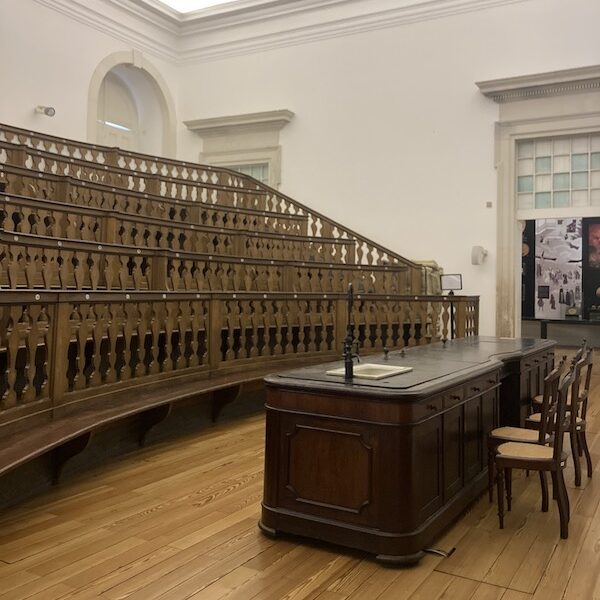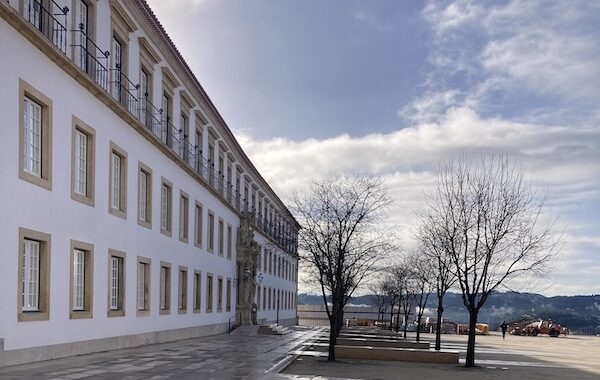At the beginning of January, I was in Coimbra, a city I had yet to explore. A visit to the University of Coimbra was inevitable, despite my somewhat tumultuous relationship with higher education. I’m glad I did because during that visit, I became acquainted with Domitília Miranda de Carvalho, a woman whose journey profoundly impacted me and made me reflect on my own rebelliousness towards academic learning.
Domitília’s story began in the 19th century when she embarked on an unprecedented adventure and, against all social norms of the time, decided she wanted to attend the University of Coimbra. Of course, it wasn’t easy when access to knowledge and higher education was exclusively a male privilege.
After completing secondary school with distinction, Domitília wrote a letter to the university rector, a man with very conservative values. In the letter, the young woman invoked the reasons why she should be allowed to take her place alongside her male peers. She did so persuasively that, with no arguments to counter, the rector was forced to accept Domitília. However, there were some strict rules she had to abide by. Among them, she always had to dress soberly in black, wear a discreet hat, and under no circumstances was she allowed to behave in a way that would make her stand out among her male classmates. Knowing that sometimes compromises must be made to pursue a dream, Domitília agreed. She enrolled at the University of Coimbra in October 1891 and, for five years, she was the only female student in Portuguese higher education. Furthermore, knowing that she would have to work twice as hard as her male counterparts to prove her merit, Domitília didn’t just enroll in one course but in two: Mathematics and Philosophy. Moreover, after completing both degrees, she enrolled again, this time in Medicine, which she also completed with distinction.



Upon arriving in Lisbon to work as a doctor at the National Tuberculosis Assistance, she realized that her true calling was in education. Honoring her rebellious side, she became a teacher at D. Maria Pia High School (now Maria Amália Vaz de Carvalho High School), the first secondary education institution established in Portugal for women. She held the position of Mathematics teacher. Once again, she became the first Portuguese woman to teach that subject.
Domitília was a rebellious woman but never lost her conservative side. She was a monarchist and followed the political-ideological principles of the Estado Novo, supporting Salazarism from its inception. I want to believe that this was one of the choices she made, aware that it would be a way to help women gain space in a world where, until then, only men could access. In this capacity, she accepted to be one of the three women invited by the National Union to join the single list of candidates for deputies in the I Legislature of the newly created National Assembly of the Estado Novo.
Nevertheless, Domitília’s conservative views did not prevent her from promoting and signing a petition in favor of the legalization of divorce in 1909. It is this versatility that leads me to believe that, despite being a supporter of a dictatorship, perhaps that was the means that allowed her to leave to all of us, Portuguese women who came after her, the legacy of equal access to opportunities in all areas of society.
I am far from being an advocate of the principle that the end justifies the means. In Domitília’s case, the concessions she made – even the seemingly more extreme ones – allowed her to set precedents and break senseless rules regarding women’s rights in Portugal. I have two higher degrees and a postgraduate degree because, in the late 19th century, Domitília didn’t accept a no as an answer to access the University of Coimbra. So, I am grateful to her. Just as I am to all the women who came before me and paved the way for the possibility of me having access to what I have today. Aware that the world is still not equal for everyone, I hope without any modesty that, in my capacity as a female entrepreneur who travels alone to any part of the world, I too leave marked trails that allow for improving the condition of those who come after me.
Accommodation Suggestions:
Hotel Astória: I stayed here about 5 years ago when I had to attend a work meeting in Coimbra. I loved the location, but above all, the charm of this historic hotel. Passing through the door is like stepping directly into the early 20th century, a time period for which I am fascinated. It has one of the most beautiful elevators I’ve ever seen.
JR Studios & Suites: This is where I stayed in January, right next to the Convent of São Francisco and in front of the Convent of Santa Clara a Velha. The rooms are spacious, with modern, elegant decor in minimalist style. The balconies offer stunning views of the city.

